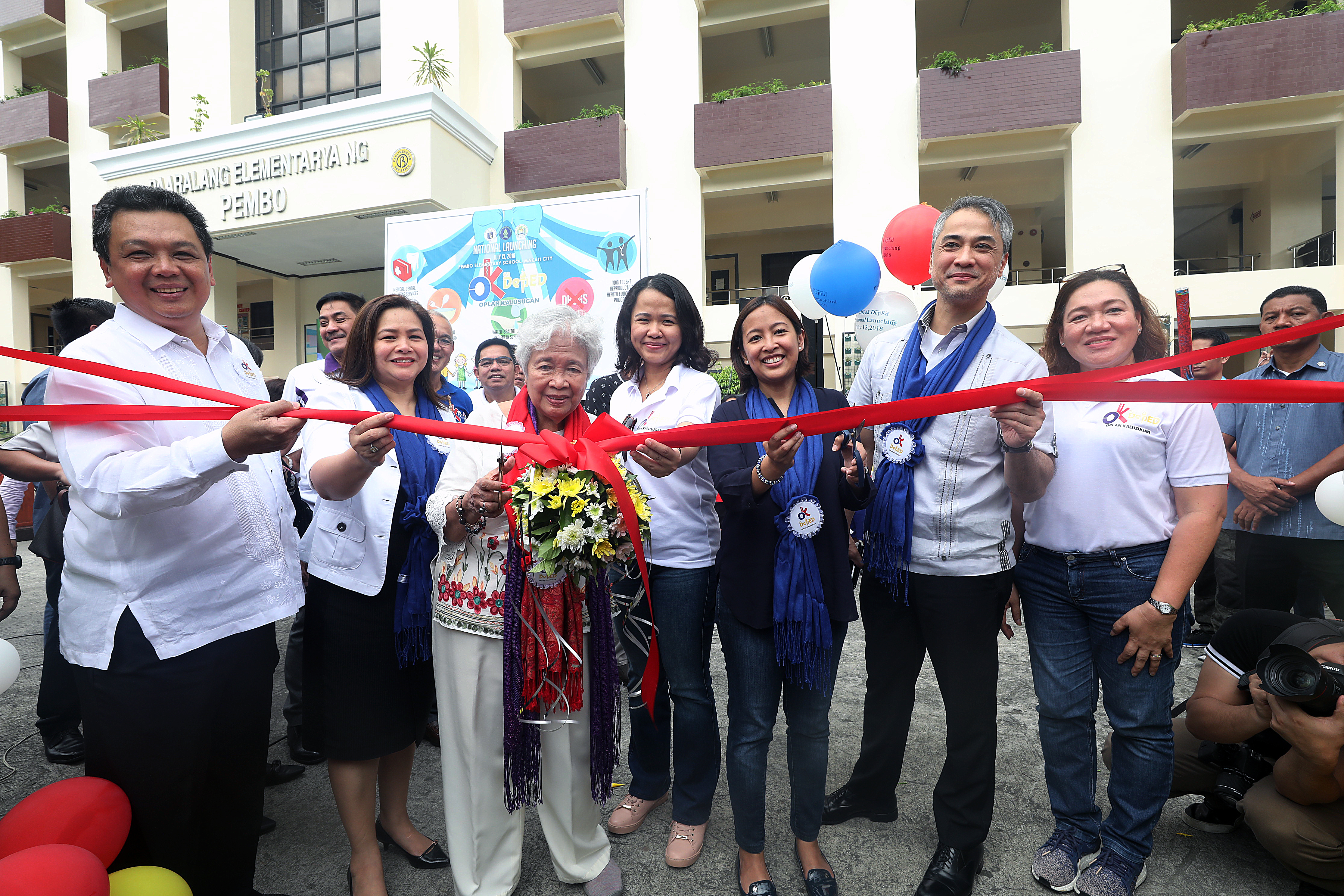MAKATI CITY, July 16, 2018 – The Department of Education (DepEd) officially launched its flagship health program Oplan Kalusugan (OK) sa DepEd, as a convergence of its health programs, plans, policies and activities, on July 13 at Pembo Elementary School in Makati City.
The national launch showcased the five major school health programs of the Department, including the School-Based Feeding Program (SBFP); National Drug Education Program (NDEP); Adolescent Reproductive Health Education (ARH); Water, Sanitation, and Hygiene (WASH) in Schools (WinS) Program; and medical, nursing, and dental services, through health booths and exhibits, caravan, forums, presentations, and other advocacy and social mobilization activities participated by regional directors, and schools division superintendents and members of the Education Support Services Division and the School Governance and Operations Divisions in the National Capital Region.
“Maraming salamat na nandito tayo ngayon to lend support. Sana hindi matatapos ang ating efforts pagkatapos ng launching,” DepEd Secretary Leonor Magtolis Briones shared during her keynote address. She also thanked the City Government of Makati, led by Mayor Abigail Binay and Representative Luis Campos, as well as other partners and stakeholders for their unwavering support to the various programs of the Department.
Education and health go hand-in-hand
Briones also underscored how education and health go hand-in-hand as the most significant indicator of poverty reduction vis-à-vis the goals of the United Nations.
The Secretary also elaborated on how the health challenges faced by the country today are different from the health challenges five years ago: “Alam natin mas complex na ngayon ang health and education problems. And then it also becomes a political and social, as well as an economic issue.”.
In response, Undersecretary for Administration Alain Del B. Pascua shared the objectives of the OK sa DepEd program: the provision of basic primary health, nutrition and dental services to learners to allow them to achieve their full educational potential; the practice of healthier behavior among school personnel and learners that they can do on their own; and the strengthening of linkages with health providers and the local governments for child and adolescent health services.
Strategic directions, ways forward
Briones and other Executive Committee members including Pascua, Undersecretary for Finance-Budget Performance and Monitoring Annalyn M. Sevilla, Undersecretary and Chief-of-Staff Nepomuceno A. Malaluan, and Assistant Secretary for Public Affairs Service and Alternative Learning System G.H. S. Ambat shared the Department’s strategic directions in terms of health and education during the press conference following the launch.
Briones reiterated that the Department is focusing largely on the preventive aspects of the campaign against illegal drugs which, she added, also involves the media, church institutions, and civil society organizations.
“In addition to the curriculum review on the integration of preventive drug education, we will be developing a supplemental education material that is more comprehensive,” Malaluan cited, adding that the Department will also seek the support of agencies including the Department of Health (DOH), Dangerous Drugs Board (DDB), and the Philippine Drug Enforcement Agency (PDEA).
Meanwhile, Sevilla added that the Department is looking forward to the crafting of the implementing rules and regulations on the recently signed national feeding program law, together with the Department of the Interior and Local Government (DILG) and the Department of Social Welfare and Development (DSWD).
She also shared DepEd’s proposal to the Department of Budget and Management (DBM) to increase the salary grade of guidance counselors, and to create an entry-level position to attract fresh graduates since the law requires the completion of a graduate degree and the passing of licensure exam for full-fledged guidance counselors.
“At malapit na nga po ang budget hearing for 2019, so isa rin po sa gusto nating ipagpatuloy ng gobyerno ay itong pagbibigay ng ating resources for the OK sa DepEd,” Sevilla mentioned.
“This, in essence, is our answer also in fulfilling our commitment to social development,” Pascua emphasized. “These are the core programs that we are implementing in DepEd, and ang attainment talaga niyan is you contribute in ending hunger, in ending poverty, etcetera.” He also shared the Department’s plan of establishing school clinics in central elementary schools that will serve as hubs and physical centers of OK sa DepEd.
The OK sa DepEd Program is spearheaded by the Office of the Undersecretary for Administration, through the School Health Division of the Bureau of Learner Support Services. More information about the program is available through DepEd Order No. 28, 2018 dated July 6, 2018.
END





